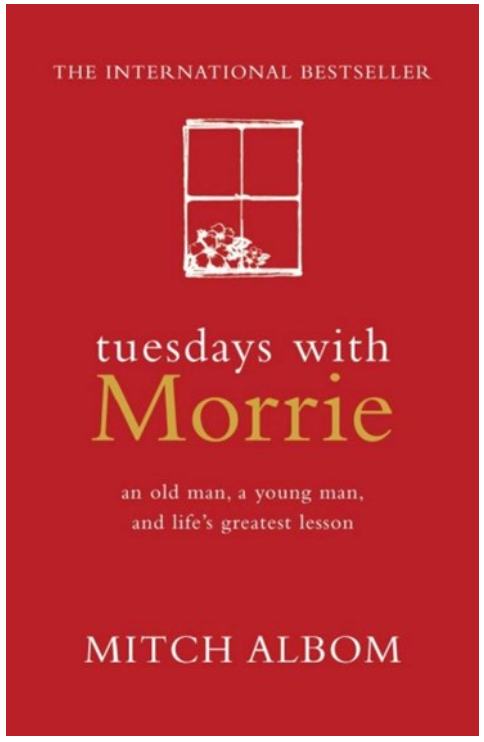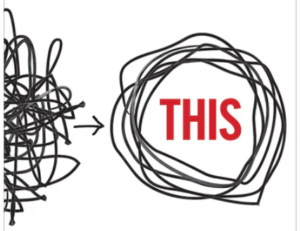Tuesdays with Morrie written by Mitch Albom

5 most impressive ideas in this book
1. Our culture doesn’t encourage you to think about death until you’re about to die. We’re busy all day, focused on ourselves, caring about careers, families, making money, paying off loans, buying new cars, fixing the broken heater – we’re busy with endless trivialities, just letting the days pass by. So, we’re not used to taking a step back, observing our lives from a distance, and then asking ourselves, ‘Is this what life is about? Is this what I want? Is something missing?’
My reflection:
The previous post supported that being aware of death and the barrenness of the busy life that our culture encourages can help you live your life by design, not by default, as mentioned in the books ‘Die with Zero’ and ‘Essentialism’. Everyone dies, and you never know when that moment is coming. Although being aware that people can die from an accident by chance at any time or quickly from serious diseases such as malignant cancer is very painful, but undeniably, this is the real aspect of life. Once you keep death in mind, you would truly immense yourself in almost every important moment spent with family and friends. You would be willing to take a step back and observe your life from a distance, then ask yourself if you love the way you are living your life at the moment and if you are missing out on something important in your life because you spend too much time on something less important. For example, ask yourself, ‘Did I spend too much time on overtime work and sacrifice my precious time with family, friends and my personal life plan?’ If your answer is yes, you probably live by default, not by design. It is dangerous if you are not aware of this at a younger age, as time flies, and soon you might be in your 50s already. You couldn’t replay your precious time at a younger age even if you regret spending too much time on work rather than strengthening connections with family and friends. More importantly, keeping the truth that death can happen to anyone at any time can be helpful with your decision on designing your own life.

2. Even though he is on the brink of death, he still respects his family and their own world. Otherwise, it’s not just him who’s destroyed by this illness, but the entire family.
My reflection:
I believe that a lot of effort, communication, and mutual trust are required to maintain the current lifestyles of every family member when one develops serious diseases and requires heavy personal care, such as mobility aids, showering assistance and feeding assistance. However, in my culture, if this happens, other family members are usually greatly impacted, especially regarding their current lifestyles, as many people tend to feel guilt and self-blame. Even though many families are able to hire their own carer to provide these personal cares, they are usually reluctant to do so but let the burden of personal care itself fall on their shoulders. They tend to do this because they want to maintain good reputations for looking after their ill family members, especially their parents, by themselves. If they don’t spend time caring for the sick family member, they might be blamed by siblings or relatives, as Asian tradition highlights children’s obligation to look after their parents unconditionally. To be frank, I contend that siblings taking turns to look after the sick family member could make their last period of life more content and happier and reduce the regret of not spending enough time saying goodbye to that family member. However, it’s also important for every family member to communicate and set boundaries when they are responsible for looking after the sick family member, in order to maintain their current lifestyle as much as possible and to avoid burning out from spending lots of time providing the sick person with personal care. When it comes to taking care of a sick family member, the person could feel less guilty about affecting other family members’ lives, and they could live better lives if they are all more aware of the importance of looking after each family member, not just the sick one.

3. Our society brainwashes us, telling us that owning things is good, earning more money is good, owning more property is better, and engaging in more business activities is better. More is better. Wherever I go in my life, I encounter people who are constantly wanting this and that. They want a new car, a new house, the latest toys. And then they can’t wait to tell you, ‘Do you know I bought this? Do you know I bought that?’
My reflection:
I began to doubt the idea that owning more things is inherently good, and that having more equates to a better life. I found an answer to this dilemma in several books, particularly in ‘Essentialism’. I believe that owning more possessions doesn’t guarantee a better life, but that minimalism and essentialism could. It felt odd considering minimalism and essentialism while surrounded by people advocating for shopping and acquiring trendy items such as popular clothes, new fancy cars, upgraded houses, luxury beach holidays and business class seats. While some of these expenses may bring positive influences to their lives, for many people, constantly chasing after these luxuries in an attempt to feel good wouldn’t necessarily lead to long-term benefits.
Considering all of these factors, I became more determined to live a life that supports minimalism and essentialism, as mentioned in the previous post. Thinking twice before making a purchase helps me spend my precious money on things or services I truly need, reducing the chances of wasting money on unnecessary products. I don’t even envy other people’s fancy possessions because I understand that those items don’t contribute to my happiness. Instead, I tend to surround myself with people who are highly aware of the essentials in their lives and share ideas with each other.

4. In today’s culture, there’s a longing for love due to its scarcity. However, many young people struggle; they’re either too self-centred to love genuinely or rush into marriages that end in quick divorces. They lack clarity on what they seek from a partner or even who they are themselves, making it challenging to understand who they’re marrying.
My reflection:
While it’s natural for everyone to yearn for love, having a deeper self-awareness is crucial when entering into a relationship or marriage. Rushing into marriage solely due to societal expectations or age pressures can diminish the enjoyment of the union. Without sufficient self-awareness, marrying someone based on imagined ideals or parental preferences can feel akin to gambling.
Taking time to cultivate self-awareness allows individuals to better understand themselves and their desired partners. This introspection can occur within relationships through dedicated communication mutual respect. By avoiding complacency and actively nurturing the relationship, couples can increase the likelihood of compatibility and happiness.
With heightened self-awareness, individuals may prioritise personal growth and fulfilment over societal pressures to marry by a certain age. Recognising that meeting the right person can be a matter of chance and luck, they may find solace in focusing on other aspects of their lives rather than fixating on marriage.

5. Being young is sometimes very miserable; many young people carry their struggles, their bitterness, their insecurities, and their despair about life, to the point where they almost want to commit suicide. Besides these pains, young people also lack wisdom; they understand very little about life. What’s the point of living like this?
My reflection:
For individuals, especially young people, cultivating self-awareness can be a powerful tool in alleviating anxiety and navigating life’s challenges. At the age of 33, I’ve experienced numerous struggles and uncertainties due to the lifestyle choices I’ve made. Opting to study and work abroad, then transitioning to a more flexible work portfolio, has been a journey marked by adversity and self-discovery.
Despite the challenges, each step I’ve taken has deepened my understanding of myself and my capabilities. Building this new lifestyle has allowed me the opportunity to reflect on my choices and make informed decisions within the constraints of time. Leaving my previous full-time job was a pivotal moment that significantly reduced my anxiety levels. I realised that embracing change and uncertainty at 33 is preferable to waiting until later in life.
Looking back on my past experiences has reinforced my belief in the importance of self-awareness. While the process hasn’t always been comfortable, I’m grateful for the chance to explore different paths and potentials. By challenging societal expectations and pursuing what feels right for me, I’m creating a life that aligns more closely with my values and aspirations.

Other key points
When you’re manipulated by others, told that buying this perfume will make you beautiful, or buying these jeans will make you sexy—and you believe them! It’s nonsense.
You need to know that you will die and be prepared at all times, so that you can truly immerse yourself in living. If you truly accept the fact that you could die at any moment, you might not be as competitive as you are now.

If you fully immerse yourself in these emotions, letting yourself dive completely into them, you experience them fully. You know what pain is, you know what love is, you know what sadness is. Only then can you say, ‘Alright, I’ve experienced this emotion, I recognize it, now I need to detach from it.
I’m inherently independent, so I always resist things like needing help to get off a vehicle, or relying on others to dress myself, etc. I feel a bit ashamed because our culture tells us that if we can’t wipe our own bottoms, it’s embarrassing. But slowly, I think: forget about what our culture says, I’ve spent most of my life disregarding it anyway. I refuse to feel ashamed; what’s the big deal? I’ve started to enjoy relying on others. It’s like going back to being a child, having someone bathe you, lift you up, wipe you clean. For me, it’s just remembering how to enjoy being an infant.

What truly brings you satisfaction? It’s being generous in sharing what you have with others. I’m not talking about money; I mean your time, your care, your skills. There’s a senior activity centre nearby where dozens of elderly people gather every day. If you understand computers, you can go there and teach them. They will welcome you and be grateful to you, and that’s how you start sharing what you have.
If you’re trying to show off to those superior to you, forget it; they’ll only look down on you. If you’re trying to show off to those inferiors to you, forget it too; they’ll only envy you. Status and position can’t bring you anything; only an open heart can allow you to get along freely with everyone.

I believe in being fully present, you should be with the person in front of you. When I talk to you, I try to focus wholeheartedly on our communication. I’m not thinking about what we talked about before, I’m not thinking about what’s happening this Friday, I’m not thinking about plans for next week.
Immutable rules for love and marriage: respect, compromise, honesty, and shared values are crucial. Without them, problems arise.
Create your own subculture. Our culture wants you to think this way: if a woman isn’t slim enough, or a man isn’t wealthy enough, but don’t fall for it.
